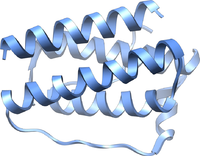
Photo from wikipedia
ABSTRACT Obesity is a common health problem. Appetite is one of the main obesity-controlling factors that can be influenced by leptin. Leptin reduces food intake and accelerates energy expenditure. Leptin… Click to show full abstract
ABSTRACT Obesity is a common health problem. Appetite is one of the main obesity-controlling factors that can be influenced by leptin. Leptin reduces food intake and accelerates energy expenditure. Leptin levels can be affected by dietary factors such as fats, special amino acids, and fructose. This study aimed to determine the effects of polyunsaturated fatty acid n-3 (PUFA n-3) supplementation on serum leptin levels, appetite sensations, and dietary intakes in obese people. This study was performed on 60 obese individuals with body mass index (BMI) 30 (kg/m2) and above in 2012 in Tabriz, Iran. The participants were randomly allocated to the intervention (consumed two capsules containing 1 g/day n-3 fatty acids [180 mg EPA, 120 mg DHA] for 4 weeks) and control groups. Serum leptin levels were assessed by ELISA method, and visual analogue scale (VAS) questionnaire was completed for evaluating appetite sensations. The mean caloric [before = 1,575.39 (600), after = 1,236.14 (448.40)] and macronutrient intakes were decreased significantly in the intervention group (p < .05). After adjusting for baseline serum leptin levels, age, and gender values, the fullness item significantly increased in the intervention group [before = 2 (1–5), after = 3 (1–5), p = .034]. In addition, BMI decreased and serum leptin levels increased nonsignificantly in the intervention group. According to the results, PUFA n-3 decreased energy and macronutrient intakes, probably through the modulating of satiety. The short period of study caused the nonsignificant changes in BMI and circulatory leptin. Further studies are needed to confirm these results.
Journal Title: Journal of Dietary Supplements
Year Published: 2018
Link to full text (if available)
Share on Social Media: Sign Up to like & get
recommendations!